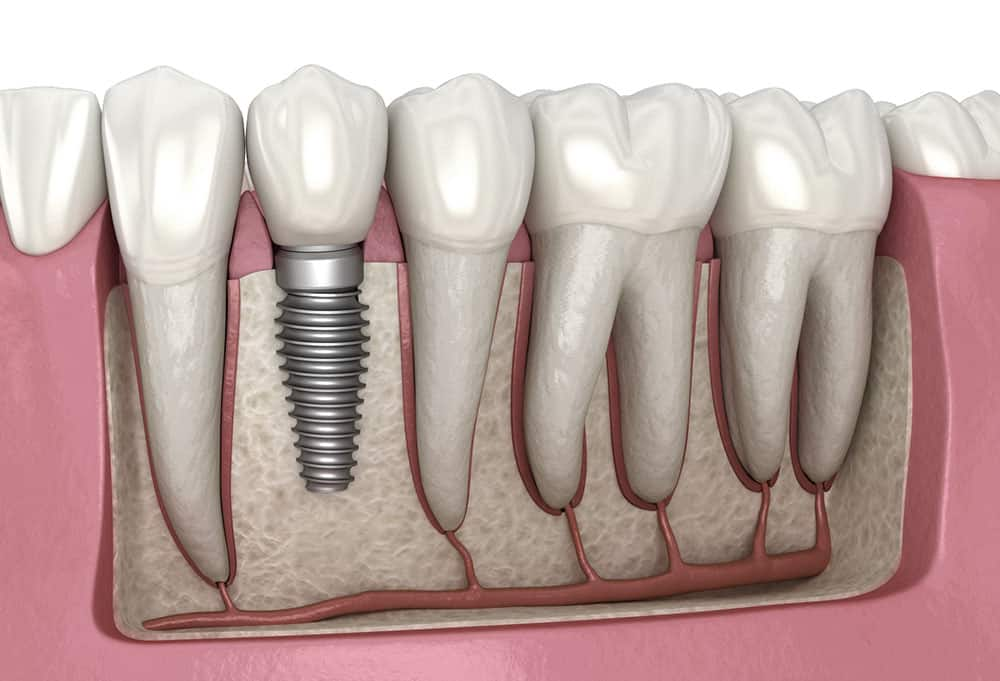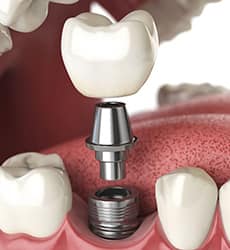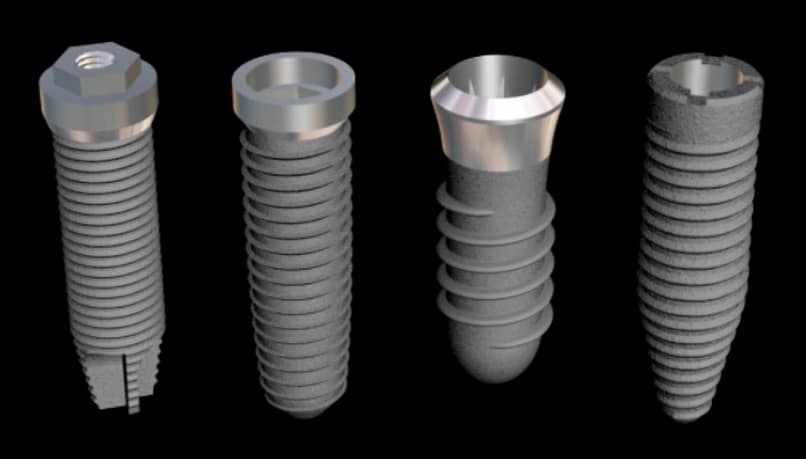Dental implants serve as replacements for missing tooth roots. And while these fixtures are permanent (having a high success rate), rarely, problems can occur, one of which is dental implant failure.
There are many reasons why this can happen. Problems on the patient’s and/or dental surgeon’s end can lead to an implant failure. However, it’s not always inevitable. In some cases, it is possible to prevent this issue from arising in the first place. That’s why it’s important to have an understanding of it. It can save you both time and money.
What Is Dental Implant Failure?
A dental implant failure refers to the inability of the titanium screw of the implant to remain embedded firmly in the jawbone. It can also come out entirely. Usually, it is believed to occur due to problems in the process of osseointegration, in which bone tissue grows around the implant.

This would occur if you have healing issues or other health problems. But implant failure can also occur due to other reasons. To better understand it, you should know about early and late dental implant failure, which is as follows:
Early Implant Failure
This occurs within 6 months after the placement of the implant. Keep in mind that 3-6 months is the time that the implant takes to integrate with the jawbone. If there’s any problem with that, it can lead to early failure. Delay in bone healing is the most common cause of early failure. However, it can also occur due to issues in the surgical technique.
For instance, the bone is overheated during the preparation of the implant site or the implant is overloaded because of poor size and design choice or from supporting too many teeth. It also comes down to the existing composition and structure of the bone and certain oral habits.
Additionally, according to a study published in the International Journal of Implant Dentistry, it is far more common for patients to have an early failure, especially if the implant was fitted in the back of the lower jaw and the patient was young. In contrast, late failure, although less common, was more prevalent in older patients who had the implant fitted in the upper jaw.
Late Implant Failure
Late implant failure usually occurs 5 years after placement. Usually, late failure occurs due to a progressive oral infection, trauma or malpositioning of the implant. Keep in mind that at this stage, the implant is fixed into the jawbone (even if partially), so its removal can be more difficult and risky; there’s also a risk of damage to the surrounding teeth.
What Is The Failure Rate Of Dental Implants?
According to a study published in the journal of Clinical Implant Dentistry and Related Research, the failure rate of a dental implant is 5-10%.
It is quite rare for dental implants to fail, considering they have a survival rate of over 90%. Also, dental implants are permanent, but the crowns fitted on them may need to be replaced after 10-15 years.
What Causes Dental Implant Failure?
Let’s take a closer look at the causes of dental implant failure:
Poor Oral Health
Poor oral hygiene results in the build-up of plaque around the teeth, which causes gum disease. Poor gum health, in turn, increases the risk of implant failure.
And according to a study published in the Journal of Clinical Periodontology, smoking is also responsible for implant failure. Smoking increases the risk of implant failure from 6.5 to 20%, according to different studies.
Keep in mind that nicotine in cigarettes constricts blood vessels, reducing the amount of oxygen, nutrients, and healing factors that reach the wound. It also interferes with the immune system and, in general, negatively affects oral health. This may be responsible for your implant failure.
Health Issues
Some health issues can impair the body’s ability to heal, which can negatively impact osseointegration and result in implant failure. This can happen if you have:
- Diabetes Mellitus
- Osteoporosis
- Rheumatoid Arthritis
- Xerostomia (dry mouth)
- Cardiovascular Diseases (affecting heart and blood vessels)
- Bruxism (teeth grinding disorder)
Keep in mind that the risk of implant failure may increase if you suffer from these health problems.
Medications & Treatments
Several clinical studies have found a link between certain medications and dental implant failure. For instance, a study done by researchers at the University of Buffalo found that antidepressants increase the risk of implant failure by 4 times.
This is because one side effect of these drugs is that they can impair bone healing. If the bone around the implant doesn’t grow properly during the osseointegration process, it will not anchor in place.
Other than antidepressants, PPIs or proton pump inhibitors (a medicine that relieves symptoms of acid-related diseases) can also result in implant failure. That’s because this drug increases the risk of vitamin and mineral deficiencies. Its long-term intake has also been associated with low bone density. So, these can also cause implant failure.
Bisphosphonates are another class of drugs that can cause osteonecrosis and implant failure. Those with penicillin allergies are also more likely to experience implant failure, although the cause remains unknown. In addition, cancer treatment can also increase the risk of a failed implant.
Infection
Peri-implant infectious diseases cause inflammation, damaging soft tissue and causing bone loss. According to a study published in the Journal of Healthcare Engineering, the implant is considered a failure if bone loss from the infection exceeds 1 mm in the first year and 0.2 mm in the second year.
You should also know that there are actually two types of this infection, depending on how severe it is:
- Peri-Implant mucositis – It is when only the soft tissue (not the bone) around the implant is affected. Your gum tissue may look red and tender. Additionally, there may be slight bleeding when you’re brushing your teeth.
While this condition is reversible, if left untreated, it can progress to peri-implantitis. Plaque removal and improved oral hygiene may be recommended by your dentist for its treatment.
- Peri-Implantitis – It occurs when the bone around the implant gets involved. And once that happens, the implant will move and can even come out. You may also have discharge, pain, swelling, a bad taste in the mouth and deeper gum pockets around the teeth. Peri-implantitis usually requires surgery for treatment.
Poor oral health can result in this infection, and its risk increases if you smoke or have another health problem.
Structural Issues
A dental implant is a three-piece design. It consists of a titanium screw, an abutment, and a dental crown. If there’s an issue with the size, placement or screwing of these elements, the implant will not be firmly anchored in place.

You’ll feel it move in your mouth. And an implant can fall off entirely if a part is too loose. Keep in mind that even implant micromovements can result in implant failure.
Titanium Rejection or Allergy
In rare cases, you may be allergic to titanium, which is used to make the implant screw. If you are having an allergic reaction to titanium, you may have the following on the skin or inside the mouth:
- Hives
- Itchiness
- Bone loss
- Necrosis
- Pain
- Swelling
- Redness
- Eczema
You may also experience other symptoms. However, if this happens, you should get in touch with your dentist immediately.
Sometimes, a titanium implant may also be rejected by the body for reasons unknown. It simply won’t integrate with the jawbone. This will also result in implant failure.
Surgical Error
Proper treatment planning is important to place a dental implant successfully. There are many things that can go wrong if your surgeon is inexperienced. All of the following factors can result in a failed implant:
- Surgical trauma (nerve or tissue injury)
- Improper site preparation
- Malpositioning of the implant
- Overloading (excessive force on the implant)
- Ill-fitting crown
- Poor choice of the implant (design and dimensions)

An experienced surgeon will also take your gum health, bone quality, and overall health status into consideration before performing the surgery. That’s because all these factors can result in the failure of the implant to integrate with the jawbone.
Other Factors
In general, wear and tear may also be responsible for the implant falling out. According to a study published in the International Journal of Implant Dentistry, wear and corrosion of the titanium implant can sometimes cause bone loss.
So, this is a possibility as well. Other than that, dental trauma (accident or injury) can also dislodge the implant from its site.
Who Is Responsible For Dental Implant Failure?
Even though dental implant failure is rare, it can happen due to various factors. It may be due to the patient’s or dentist’s negligence or environmental factors. You should discuss this complication with your dentist before getting an implant to avoid it. This way, you may even prevent it from happening.
Additionally, on your end, you should make sure to find a licensed and board-certified dentist. The dentist should inform you of the risks of the implant while considering your medical history. S/he should follow a proper diagnostic process, ensure sterilisation, and obtain your informed consent. If this isn’t done, the implant can fail. For this reason, you should choose your surgeon carefully.
What Are The Signs Of Dental Implant Failure?
If you’re experiencing the following, you may have dental implant failure:
- Loose or mobile implant
- Discomfort
- Pain
- Swelling
- Bleeding
- Infection
- Gum recession (exposed implant)
- Difficulty chewing, speaking, or opening the mouth
- Bad breath
- Discharge
If you have experienced nerve damage, you might also have numbness or tingling.
What Is The Treatment For Dental Implant Failure?
For a proper diagnosis, your dentist will perform a physical exam, ask about your medical history and even take an X-ray to assess bone health. It will not be possible to place an implant if there is significant bone loss.
In this case, the dentist will first perform bone graft surgery to rebuild the bone. Your body may take between 3-9 months to heal after this procedure. And the implant will only be placed after that. However, if implant replacement is not possible, your dentist may recommend the following:
- Dental Bridge
- Dentures (full or partial)
A dental bridge doesn’t need an implant to be fixed into place. The bridge can be attached to either side of the gap left by the missing tooth. Similarly, you can wear dentures without having implants, but they may move around. Additionally, they won’t prevent the loss of the jawbone. So, make sure to discuss these pros and cons with your dentist.
How To Prevent Dental Implant Failure?
Here are some tips for preventing dental implant failure:
- Maintain good oral hygiene (brush twice and floss)
- Wear a night guard if you grind your teeth
- Eat foods that support bone health (dairy, leafy greens, nuts, dried fruits, citrus fruits, fish)
- Do not smoke
- Visit your dentist after every 6 months
Ask your dentist what you can do to reduce the risk of implant failure if you suffer from a health condition.
Conclusion
Dental implant failure is a rare complication that can occur due to many reasons. It can occur months or even years after the implant has been placed.
In order for dental implants in Turkey to integrate successfully with your jawbone, your overall health (including your oral health) can play a significant role. If you feel like there is a problem with your implant, make sure to get in touch with your dentist as soon as possible.
